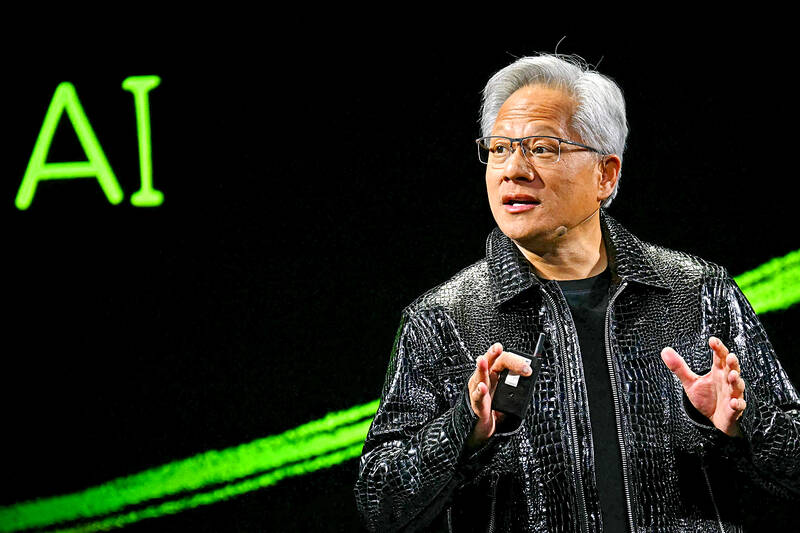US technology company Nvidia Corp and Fujitsu Ltd, a Japanese telecommunications and computer maker, yesterday agreed to work together on artificial intelligence (AI) to deliver smart robots and a variety of other innovations using Nvidia’s computer chips.
“The AI industrial revolution has already begun. Building the infrastructure to power it is essential in Japan and around the world,” Nvidia chief executive officer Jensen Huang (黃仁勳) said, hugging his Fujitsu counterpart Takahito Tokita on stage.
“Japan can lead the world in AI and robotics,” Huang told reporters at a Tokyo hotel.

Photo: AFP
The companies would work together on building what they called “an AI infrastructure,” or the system on which the various futuristic AI uses would be based, including healthcare, manufacturing, the environment, next-generation computing and customer services. The hope is to establish that AI infrastructure for Japan by 2030.
It would initially be tailored for the Japanese market, leveraging Fujitsu’s decades-long experience there, but might later expand globally, and would utilize Nvidia’s graphics processing units (GPUs), which are essential for AI, according to both sides.
The two executives did not outline specific projects or give a monetary figure for planned investments, but exploring collaboration in AI for robots with Yaskawa Electric Corp, a Japanese machinery and robot maker, was noted as a possible example.
AI would be constantly evolving and learning, they said.
Fujitsu and Nvidia have been working together on AI, speeding up manufacturing with digital twins and robotics to tackle aging Japan’s labor shortages.
Tokita said the companies were taking a “human-centric” approach aimed at keeping Japan competitive.
“Through our collaboration with Nvidia, we aim to create new, unprecedented technologies and contribute to solving even more serious social issues,” Tokita said.

POWERING UP: PSUs for AI servers made up about 50% of Delta’s total server PSU revenue during the first three quarters of last year, the company said Power supply and electronic components maker Delta Electronics Inc (台達電) reported record-high revenue of NT$161.61 billion (US$5.11 billion) for last quarter and said it remains positive about this quarter. Last quarter’s figure was up 7.6 percent from the previous quarter and 41.51 percent higher than a year earlier, and largely in line with Yuanta Securities Investment Consulting Co’s (元大投顧) forecast of NT$160 billion. Delta’s annual revenue last year rose 31.76 percent year-on-year to NT$554.89 billion, also a record high for the company. Its strong performance reflected continued demand for high-performance power solutions and advanced liquid-cooling products used in artificial intelligence (AI) data centers,

SIZE MATTERS: TSMC started phasing out 8-inch wafer production last year, while Samsung is more aggressively retiring 8-inch capacity, TrendForce said Chipmakers are expected to raise prices of 8-inch wafers by up to 20 percent this year on concern over supply constraints as major contract chipmakers Taiwan Semiconductor Manufacturing Co (TSMC, 台積電) and Samsung Electronics Co gradually retire less advanced wafer capacity, TrendForce Corp (集邦科技) said yesterday. It is the first significant across-the-board price hike since a global semiconductor correction in 2023, the Taipei-based market researcher said in a report. Global 8-inch wafer capacity slid 0.3 percent year-on-year last year, although 8-inch wafer prices still hovered at relatively stable levels throughout the year, TrendForce said. The downward trend is expected to continue this year,

Vincent Wei led fellow Singaporean farmers around an empty Malaysian plot, laying out plans for a greenhouse and rows of leafy vegetables. What he pitched was not just space for crops, but a lifeline for growers struggling to make ends meet in a city-state with high prices and little vacant land. The future agriculture hub is part of a joint special economic zone launched last year by the two neighbors, expected to cost US$123 million and produce 10,000 tonnes of fresh produce annually. It is attracting Singaporean farmers with promises of cheaper land, labor and energy just over the border.

US actor Matthew McConaughey has filed recordings of his image and voice with US patent authorities to protect them from unauthorized usage by artificial intelligence (AI) platforms, a representative said earlier this week. Several video clips and audio recordings were registered by the commercial arm of the Just Keep Livin’ Foundation, a non-profit created by the Oscar-winning actor and his wife, Camila, according to the US Patent and Trademark Office database. Many artists are increasingly concerned about the uncontrolled use of their image via generative AI since the rollout of ChatGPT and other AI-powered tools. Several US states have adopted